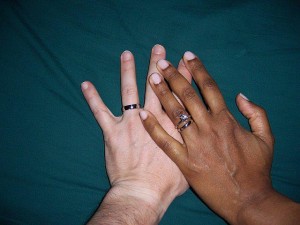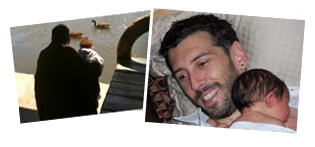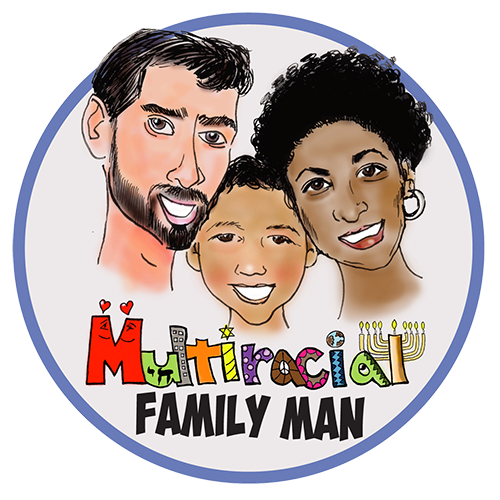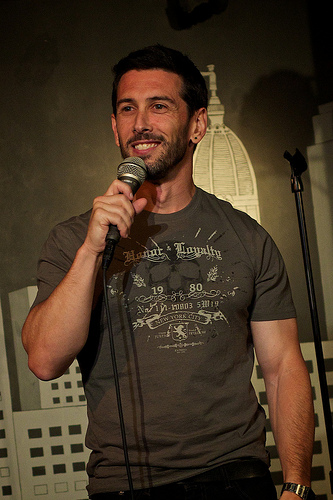This morning, like every morning, my wife and I walked our son to daycare. It was an unremarkable event, replicated by thousands, if not millions, of families across this country. That our family is multiracial (my wife is Black, I am White, our son, Biracial) was of no relevance to this event.
Not a minute after my wife and I parted company, a woman approached me, said she thought our son was cute and then asked whether my wife was the Nanny.
“No,” I said. “That’s my wife. Our son’s mother.”
By the way, the woman who asked this was a Black woman, proving that assumptions about race are not the province or exclusive property of one race or one kind of people.
I know I shouldn’t be shocked. This is not the first time that the “nanny” question has been asked of us. My wife has been asked countless times whether she’s the nanny. If she got a nickel every time she was asked, she’d have made as much money off the word “nanny” as Fran Drescher.
As I walked away from the woman, it occurred to me how fortuitous it was that she was asking this very question on the day before Loving Day — the day marking the anniversary of the 1967 Supreme Court decision in Loving v. Virginia, which struck down laws in 16 states that outlawed marriage between people of different races.
Although my chosen career path now is comedy, I am a lawyer, and I remember studying that case, Loving v. Virginia, in law school. Then, it seemed like just a piece of history. I never imagined that the case would become such an important part of my life.
But now, every time someone asks me if my wife is the nanny, or people spew hate speech in response to seeing a multiracial family in a Cheerios ad, or the police are called when a parent in a multiracial family is suspected of kidnapping his/her own kids because the kids have a slightly different skin color, or people (people I know) ask me why I married a Black woman, I am reminded that marrying outside someone’s race still is not common or viewed as “normal.”
Are my wife and I heroes for what we’re doing? No, we’re not. Mildred and Richard Loving were heroes. They went to jail to stand up for what they believed in and for whom they loved. They fought their case in the courts for 9 years until they were vindicated. They dealt with the strong and scary forces of segregation in the Deep South of the 1950s and 60s. They were heroes. My wife and I, we’re just standing on their shoulders. And, our hope is that by the time our son is old enough to consider getting married, the only question people will ask him will not be about race but will be why he waited so long because “somebody wants to be a grandmother already.”
In the meantime, for those of you who may not be familiar with Loving Day and multiracial couples and families, here is some more information:
Loving Day is June 12 – every year. Celebrations are held around the country. See LovingDay.org. If you cannot make it to one of the celebrations, you can commemorate the event by sending me money. I will be sure to send you a photo of myself spending that money on an appropriately-themed multiracial event — such as dinner for my wife and me.
And, remember, multiracial families are just like everyone else. When we go home, we make fun of that weird dude at work too.
 In all seriousness, for those of you who want to understand more about Loving Day, please read this speech prepared by Mildred Loving on the 40th anniversary of her landmark case:
In all seriousness, for those of you who want to understand more about Loving Day, please read this speech prepared by Mildred Loving on the 40th anniversary of her landmark case:
When my late husband, Richard, and I got married in Washington, DC in 1958, it wasn’t
to make a political statement or start a fight. We were in love, and we wanted to be
married.
We didn’t get married in Washington because we wanted to marry there. We did it there
because the government wouldn’t allow us to marry back home in Virginia where we
grew up, where we met, where we fell in love, and where we wanted to be together and
build our family. You see, I am a woman of color and Richard was white, and at that
time people believed it was okay to keep us from marrying because of their ideas of who
should marry whom.
When Richard and I came back to our home in Virginia, happily married, we had no
intention of battling over the law. We made a commitment to each other in our love and
lives, and now had the legal commitment, called marriage, to match. Isn’t that what
marriage is?
Not long after our wedding, we were awakened in the middle of the night in our own
bedroom by deputy sheriffs and actually arrested for the “crime” of marrying the wrong
kind of person. Our marriage certificate was hanging on the wall above the bed.
The state prosecuted Richard and me, and after we were found guilty, the judge declared:
“”Almighty God created the races white, black, yellow, malay and red, and he placed
them on separate continents. And but for the interference with his arrangement there
would be no cause for such marriages. The fact that he separated the races shows that he
did not intend for the races to mix.” He sentenced us to a year in prison, but offered to
suspend the sentence if we left our home in Virginia for 25 years exile.
We left, and got a lawyer. Richard and I had to fight, but still were not fighting for a
cause. We were fighting for our love.
Though it turned out we had to fight, happily Richard and I didn’t have to fight alone.
Thanks to groups like the ACLU and the NAACP Legal Defense & Education Fund, and
so many good people around the country willing to speak up, we took our case for the
freedom to marry all the way to the U.S. Supreme Court. And on June 12, 1967, the
Supreme Court ruled unanimously that, “The freedom to marry has long been recognized
as one of the vital personal rights essential to the orderly pursuit of happiness by free
men,” a “basic civil right.”
My generation was bitterly divided over something that should have been so clear and
right. The majority believed that what the judge said, that it was God’s plan to keep
people apart, and that government should discriminate against people in love. But I have
lived long enough now to see big changes. The older generation’s fears and prejudices
have given way, and today’s young people realize that if someone loves someone they
have a right to marry.
Surrounded as I am now by wonderful children and grandchildren, not a day goes by that
I don’t think of Richard and our love, our right to marry, and how much it meant to me to
have that freedom to marry the person precious to me, even if others thought he was the
“wrong kind of person” for me to marry. I believe all Americans, no matter their race, no
matter their sex, no matter their sexual orientation, should have that same freedom to
marry. Government has no business imposing some people’s religious beliefs over
others. Especially if it denies people’s civil rights.
I am still not a political person, but I am proud that Richard’s and my name is on a court
case that can help reinforce the love, the commitment, the fairness, and the family that so
many people, black or white, young or old, gay or straight seek in life. I support the
freedom to marry for all. That’s what Loving, and loving, are all about.




4 Comments on “Honoring Loving Day”
Thank you for sharing this. I am a white woman in a relationship with a wonderful African man. We have two beautiful children. I had never heard of this case and am thankful to have learned about it.
Thanks so much for writing. So glad we could provide some helpful information.
Wow. that is a new one, being mistaken for the ‘nanny’. crikey
You’d be surprised at how many times we’ve been asked.
Leave a Comment